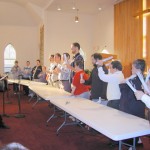Support
 The congregation supports inclusion of persons with disabilities and mental illness through awareness-raising events, educational materials and activities, support groups, and provision for individual differences in gifts, behavior, and learning style.
The congregation supports inclusion of persons with disabilities and mental illness through awareness-raising events, educational materials and activities, support groups, and provision for individual differences in gifts, behavior, and learning style.
This emblem will be awarded by meeting the criteria in any of the following areas. All are recommended.
Mission Statement
____ Mission Statement. The congregation has language in its mission statement, covenant, or other foundational document addressing its intention to provide access to, and inclusion of, people with disabilities and mental illness.
Awareness and Education
Awareness and Education Activities. At least one of these awareness-raising activities has been carried out within the past year.
____ Disabilities awareness. Disabilities awareness is promoted by the observance of annual awareness events in the worship or education program of the congregation. Example: Disabilities Awareness Week (Disabilities Awareness Week (second week in March in the U.S.).
____ Mental health awareness. Mental health awareness is promoted by the observance of annual awareness events in the worship or education program of the congregation. Examples: Mental Health Month (May), Mental Illness Awareness Week (first week in October in the U.S.)
____ Sermons. At least one sermon relating to disabilities and/or mental health issues has been preached.
____ Educational events. At least one workshop, seminar, or educational series has been held in the congregation.
Questionnaire
____ Individual and Family Needs Questionnaire. Members and attendees have been surveyed within the last three years about disabilities and mental illness present in their families and how the congregation may become more inclusive, supportive, and accessible to them. (This questionnaire is available on the CAN website and is adaptable to any congregation.)
Library Resources
____ Library Resources. Educational materials on disabilities and mental illness are available in the congregation’s library, office, or other space open to attendees.
Training
Training. The following training opportunities are provided and promoted.
____ Leadership knowledge and training. Congregational leaders have been educated in general terms on the differences between diagnoses of mental illness, learning disabilities, developmental disabilities, etc. Those who work directly with persons with disabilities have received specific instruction or training on those disabilities.
____ Companion training. Training has been held in the past two years for persons who serve as aides or companions to persons with disabilities and/or mental illness.
____ Hospitality training. Specific training is provided to greeters and ushers so they can better help individuals with mental illness and other disabilities feel welcomed, accepted, and included in the congregation.
Special Education
Special Education Services. The following special education services are offered:
____ Classroom Integration. Children and adults with developmental, intellectual, and learning disabilities and differences are welcomed in the regular education program of the congregation through the use of special materials, teaching methods, behavioral supports, and classroom aides as necessary.
____ Special education classes. Classes are provided for adults with developmental disabilities which support their abilities to learn without treating them like children.
____ Individual Spiritual Formation Plan (ISFP). An ISFP is on file for children and adults who need special considerations in order to be included in worship, spiritual education, and/or other aspects of congregational life.
Referrals
____ Referrals. Congregational leaders have a working knowledge of counseling professionals and appropriate agencies in the community to whom they can refer people with questions or needs in the area of mental health or disabilities.
Gift discernment
Gift discernment. The congregation’s gift discernment process includes consideration of persons with disabilities, including mental illness.
 ____ Mission and Service. The congregation has ministry and service opportunities (e.g. choir, teaching, ushering, elder, etc.) open to persons with disabilities, including mental illness.
____ Mission and Service. The congregation has ministry and service opportunities (e.g. choir, teaching, ushering, elder, etc.) open to persons with disabilities, including mental illness.
 ____ Discernment Process. The congregation has a gift discernment process whereby persons with disabilities, including mental illness, are asked to share their abilities in the congregation and community outreach.
____ Discernment Process. The congregation has a gift discernment process whereby persons with disabilities, including mental illness, are asked to share their abilities in the congregation and community outreach.
Individual and Family Supports
Individual and Family Supports. The following services are offered and promoted.
____ Benevolence fund. A benevolence fund (or other financial support structure) is available through the congregation to provide financial assistance for expenses incurred above and beyond insurance coverage for members, including those who have a mental illness or other disability.
____ Respite. The congregation has designated individuals who can provide respite care to family members who have dependents with disabilities and/or mental illness.
____ Facility availability. The congregation’s facility is available free of charge to community support groups on issues involving disabilities, mental illness, addictions, etc.
____ Support groups. The congregation organizes support groups or caring circles for people who have disabilities (including chronic mental illness) and their families.
____ Special Diets. Special diets (e.g. diabetic, gluten-free) are considered when food is served.
____ Other congregational supports. ___________________________________________________________________
| << Vision | Take Survey >> |



